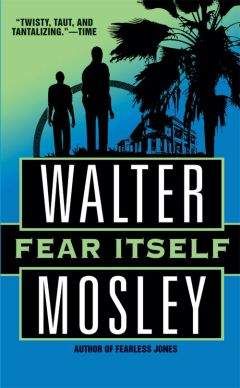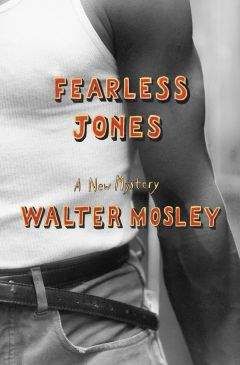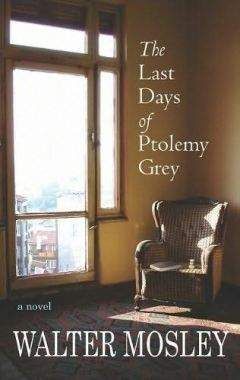Walter Mosley - The Long Fall
I looked around the cabin, expecting to see terror in the eyes of the other passengers. I was wrong there, too. Two ladies were having what seemed like a pleasant conversation. One guy was reading his newspaper, and the man next to him was sleeping.
The world outside my window was the same blue of the sky in my dream. For some reason the memory of the nightmare partially negated the terror of the flight.
At some point I was further distracted from my fear when an errant thought entered my mind. I remembere sd. ifyd that I didn’t even know what Roger Brown looked like. I had maybe doomed a man without ever seeing his face.
The flight banged on like an old truck without shock absorbers making its way down a rutted country road. But the tumult and roar receded in my mind. I’d never been in the armed forces, but I had been through a war or two. This ride, I came to feel, was little more than one of my cold showers, a prelude to a weeklong day of adversities. I grinned at the fear roiling inside me. I didn’t owe it anything but my company.
Ê€„
14
As soon as I got off the plane my hands began to tremble. The fear that I’d held down blossomed, forcing me to walk slowly so as not to stumble. It was a small airport with a magazine rack and a hot dog stand but it felt like nirvana to me.
Zephyra had reserved a car at the best rental service. Somehow she had pooled the various credit-card air miles and rent-a-car points of all her clients so that we usually got good deals on flights, rentals, and even some hotels.
A pleasant young man with pimples and big teeth gave me a map and the keys to a downsized red SUV. I sat in the driver’s seat for a long time, studying the city streets. I’d been to Albany many times before because that’s the state capital and a large percentage of your politicians are crooks. I’d done cover-ups and smears across the board up there but I didn’t know the city the way I knew New York, so I took the time to refamiliarize myself with the general lay of the town.
The car radio was playing “Smooth Operator” by Sade when I turned my attention from map to match-book. It was a wonder to me that with all the searching by security experts they couldn’t come up with a book of matches. Luck, more than anything else, is what saved you up in the air.
Oddfellows Pub, the matchbook’s advertiser, was on the north side of town. It seemed like a straightforward deal: I’d go to the bar, flash Ambrose’s card along with a story, and they would have some memory, allowing me to get that much closer to this pretender’s throat. But there again I was mistaken.
That stretch of North Pearl Street was lined with businesses that were slowly being crushed by mall culture. There was OK Hardware with its cracked glass door held in place by reinforcing wire, a dowdy chain convenience store, two dress shops, some squat brick office buildings, and Oddfellows Pub. The bar had a plaster façade pretending to be bricks that were too red and mortar that was toothpaste white. There was a small window with a blue-and-red neon beer stein that shivered as if it wanted to complete the circuit of some long forgotten animation. The front door had a regular knob on it, making it seem as if you were entering a private residence rather than a place of business; that was my first misgiving.
Opening the door, I heard Patsy Cline singing pure notes through a scratchy jukebox needle.
There was no Confederate flag hanging over the bar, but then again, neither was there any love lost in the eyes of the patrons. They became aware of me entering their dingy domain the way an owl suddenly no vthetices a snake moving in the grass below. The men, all of them white, had stopped their drinking and conversation to fix me on the pinboards of their minds. I counted eleven, including the bartender, and if it hadn’t been a matter of life and death I would have turned around and walked out immediately.
It wasn’t 2008 everywhere in America. Some people still lived in the sixties, and others might as well have been veterans of the Civil War. In many establishments I was considered a Black Man; other folks, in more genteel joints, used the term “African-American,” but at Oddfellows I was a nigger where there were no niggers allowed.
As I said, I knew the right move was behind me but instead I walked into the dark room and up to the Formica bar, just a tourist stopping for a quick beer. The pale bartender was bald like I am, but taller. He wore a shirt with thick red stripes on white, strapped over by dark-green suspenders. There was an old Pabst Blue Ribbon name tag pinned to one strap. The tattered badge read, “Hi, I’m Jake.”
Jake didn’t like me.
“Whatever you got on tap,” I said.
The bartender, who was about my age too, smirked and turned his back. As he moved away down the soggy corridor behind the bar I decided that, even if he did serve me, I would not drink.
But I didn’t have to worry. I wasn’t going to receive service in 1953 Albany. Jake moved down the bar, stopping at a customer who was sitting at the far end. They shared a few words, glanced in my direction, and then laughed.
In some ways the objective of the private detective is similar to that of the beat cop. You have an aim—the end of your shift—but there are many distractions along the way. You have to live completely in every moment, because if you get beyond yourself something will certainly blindside you and leave you face down in the street.
I wanted to save Roger Brown, which meant locating, and maybe dislocating something on, Ambrose Thurman. But before I could do any of that I had to get through Oddfellows. I considered walking around the room, asking if anyone had seen the face on the fake business card. But I rejected that approach. A room full of half-drunk men who wouldn’t like you in the best of circumstances could easily ramp themselves up into a frenzy.
I decided that this was a dead end and that I should move on.
I had been in the pub for no more than three minutes.
Just as I was about to turn a tall and hale redhead stood up from a table in the corner. He was young, maybe twenty-five, and had the look of a kid who had just taken a dare. He smiled broadly and walked in my direction, so I put off my exit for one minute more.
“Hey,” the young man said, grinning and friendly. He was handsome like a fifties TV child star who had grown up losing nothing of the boyish charm that got him through.
“S’hap {izet gpenin’?” I replied, deciding to be who he thought I was.
“What you doin’ here?” he said, still showing teeth. It was almost as if there was no threat in the room at all. Almost.
“S’posed to meet a guy.”
“What guy?”
I took Ambrose Thurman’s card from my jacket pocket and handed it to him. His fingers were pale and thick. The nails had some dirt under them, which made me like the person he might have been.
He studied the photo and name.
“Know him?” I asked.
He handed the card back to me.
“What’s yer name?” was his reply.
“Bill. What’s yours?”
“Jonah.”
“Like with the whale?”
The kid smiled. We might have gotten along in other circumstances . . . on some far-flung planet. He glanced around, as if the eyes on us were about him.
“Maybe we should talk outside,” he suggested.
I nodded and turned toward the door.
“Out back,” he said. “Come on, this way.”
Jonah moved toward a short hallway at the far end of the bar. After a moment’s hesitation I followed.
Being a boxer, even just an amateur like me, can make a man reckless. I’ve stood in the ring, sparring with heavyweights, and held my own. But that was many years before, and there was more rust than iron in my joints of late. Still, I had the confidence of a man Jonah’s age.
When I caught up to him he was opening the back door. He went through first and I paused to make sure there was no one coming up behind us. As I passed the threshold Jonah sucker-punched me with a right hook that had some smarts to it. The blow sent me crashing into a herd of aluminum trash cans. I was down, but the only thing that hurt was my sense of smell. Garbage had been festering on that dark alley floor for decades.
Jonah was wearing serious motorcycle boots. I could see the steel-shod heel of one as he tried to stomp my face with it.
A good thing about being a boxer is that you have reason to be confident. My reflexes were twice what they should have been. I grabbed Jonah’s foot and rolled with it until he was down on the ground with me. Then I scrambled to my feet, slammed the back door shut, and wedged the edge of a metal trash can under the doorknob so that we wouldn’t be dis {oulmy turbed.
Jonah rose to his feet effortlessly and grinned. I could see then that he was one of those adorable sociopaths that can love you or kill you with the same friendly smile on his lips.
My mind was a calculating machine right then. There were ten men behind a flimsy wooden door who would most likely be on the kid’s side, and there was Jonah, who felt that he could make short shrift of me with three well-placed blows.
I wasn’t worried about Jonah. What had me sweating was the clock back in the bar. In three minutes guys would be banging on the door, in five they’d either break through or come around the outside.
The first rule in the streetfighter’s handbook is—when in doubt, attack.
I crouched down and moved forward, delivering a one-two combination to the kid’s middle. He threw a punch that landed on the side of my head but I was ready this time and paid him back in duplicate. I hit him in the gut again and he felt it. His hands came down and I was able to get in two uppercuts before he moved backwards. My short legs have always been strong, and even at my advanced age I had a spring in my left. I leaped and connected with a straight right, got my balance, and delivered two left jabs and then another right.
Jonah was bleeding pretty good from a rupture on his left cheekbone. He was breathing hard, and I was, too. I stood back to catch my breath, counting off the seconds in the back of my mind. Jonah took a staggery step forward and then fell face down into a puddle of glistening gray glop.
My legs were ready to run but I stopped long enough to turn the kid over. It would have probably been saving some innocent’s life to let Jonah die in that alley, but I had my new leaf to consider, and I was feeling some largesse after having won the test of arms.
Ê€„
15
I got way too much pleasure out of beating on Jonah. Running down the alleyway behind the bar, I felt giddy over my performance. I still had it. I was still in the game.
Still a fool, was more like it.
I was in my red SUV speeding away in less than the five minutes it would have taken for the Oddfellows to be after me. My knuckles hurt and I was breathing hard to work off the adrenaline that the fight set loose. When the blood pressure began to fall I became aware of the fact that I’d messed up the one clear chance I had of getting to Thurman. My contacts in the city and state police departments of Albany were pretty much useless at that juncture. One man had been murdered and another was missing. I couldn’t make my connection to them public record. The police had to be kept out until I knew more.
The summer sun was still in the sky at six. I made my way to the South End. That part of town looked a bit seedier but was more to my sensibilities. There were black and brown peoples in among the whites, and so nobody would single me out for special treatment.
On Standard I passed a glass-and-plaster hotel named Gray Wolf Inn. It was a modern structure hemmed in by older, nondescript buildings that were neither offices nor warehouses, commercial spaces nor living lofts. These buildings had once been factories where Americans worked to feed their families and pay their bills. My father had spent his life organizing unions in places like this. They broke his bones and sent him to jail more than once, but he kept on organizing. Now the factories were all shut down and the unions reduced to rusty old buttons and yellowing membership cards in forgotten trunks. My father was long gone, as were the vestiges of his blood and hard work.
Gray Wolf had a glass door that opened onto a short hallway ending at a gunmetal elevator. On the right was a clear plastic cage where there sat an emaciated and sallow-skinned white lad whose eyes had seen more years than he had actually lived.
The young man didn’t have a proper desk. He was seated on a swivel stool at a turquoise ledge that jutted from the ochre wall. When I cleared my throat he stood up and approached the plastic barricade that sealed him away from danger. I was thankful for the barrier, certain that if he got a whiff of the sour odor of garbage on my clothes he wouldn’t have given me a room.
“How many nights?” the old-young man asked. He was wearing a blue shirt and blue pants but still the colors managed to clash—with each other and with the dirty yellow walls.
“Let’s start with one,” I said.
“Thirty-six ninety-six a night, including tax,” the impossibly skinny and long-faced kid announced. “Two-night minimum. The second night is a deposit against damages. That’s seventy-three ninety-two. Cash, no check.”
“What if I gave you a credit card?”
“Huh?”
“Never mind.”
“There’s an extra fee of ten dollars,” the kid droned on, getting back into the groove of his spiel, “if you have guests.”
“No guests for me,” I said.
Some feeling must have escaped with those words because the kid gave me a closer look then. He seemed to be gauging me, but I wasn’t concerned.
He opened a sliding panel in front of him and placed a pen and registration form down on the plastic top, closed the panel, pressed a button, and then gestured for me to lift the panel on my side. I filled out the sheet, using the name Carter, with an address in Newark, New Jersey. I placed four twenty-dollar bills on the sheet and slid the panel closed (it locked shut immediately).
“Keep the change,” I told the kid.
He didn’t crack a smile or even nod in thanks, but I didn’t mind.
ƒ
I’VE BEEN IN third-class cruise-ship cabins that were larger than that room. Just one big bed that ended a few inches from a sliding, hollow pine door that opened onto the toilet. Standing at the sink, my butt was in the shower stall. To look out the window I had to get on my knees on the bed.




